
ΑΙhub.org
Happy International Women’s Day!
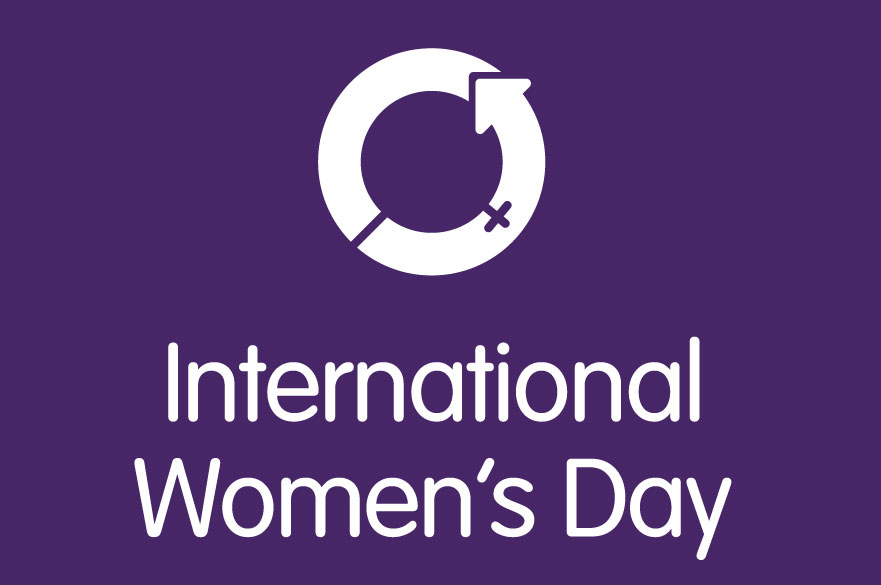
To celebrate International Women’s Day, we take a look back over the past year and highlight some of the women we’ve interviewed, written about, chatted to, and featured on AIhub.
 Rose Nakasi is a Lecturer of Computer Science and a Research Scientist at the Makerere Artificial Intelligence Lab, in Makerere University, Uganda. She holds a PhD in Computer Science from Makerere University. Her research interests are in artificial intelligence and data science, and particularly in the use of these for developing improved automated tools and techniques for microscopy diagnosis of diseases like malaria in low-resourced but highly endemic settings.
Rose Nakasi is a Lecturer of Computer Science and a Research Scientist at the Makerere Artificial Intelligence Lab, in Makerere University, Uganda. She holds a PhD in Computer Science from Makerere University. Her research interests are in artificial intelligence and data science, and particularly in the use of these for developing improved automated tools and techniques for microscopy diagnosis of diseases like malaria in low-resourced but highly endemic settings.
We spoke to Rose Nakasi about her work developing machine learning techniques to aid diagnosis of microscopically diagnosed diseases: Interview with Rose Nakasi: using machine learning and smartphones to help diagnose malaria.
 Lily Xu is a PhD student in computer science at Harvard University. Her research focuses on advancing AI methods in machine learning and game theory to address environmental challenges, particularly wildlife conservation through poaching prevention. She is a co-organiser of the Mechanism Design for Social Good (MD4SG) research initiative, and serves as AI Lead for the SMART Partnership, helping to build computational and research solutions for effective conservation management.
Lily Xu is a PhD student in computer science at Harvard University. Her research focuses on advancing AI methods in machine learning and game theory to address environmental challenges, particularly wildlife conservation through poaching prevention. She is a co-organiser of the Mechanism Design for Social Good (MD4SG) research initiative, and serves as AI Lead for the SMART Partnership, helping to build computational and research solutions for effective conservation management.
We chatted to Lily as part of our New voices in AI series, and you can watch the interview here: New voices in AI: environmental conservation with Lily Xu.
Also, see our previous (2021) written interview with Lily about her work here: Interview with Lily Xu – applying machine learning to the prevention of illegal wildlife poaching.
 Maria De-Arteaga is an Assistant Professor at the University of Texas at Austin. She holds a joint PhD in Machine Learning and Public Policy from Carnegie Mellon University’s Machine Learning Department and Heinz College. Her research is focused on algorithmic fairness and human-AI complementarity. She characterizes how societal biases encoded in historical data may be reproduced and amplified by ML models, and develops algorithms to mitigate these risks.
Maria De-Arteaga is an Assistant Professor at the University of Texas at Austin. She holds a joint PhD in Machine Learning and Public Policy from Carnegie Mellon University’s Machine Learning Department and Heinz College. Her research is focused on algorithmic fairness and human-AI complementarity. She characterizes how societal biases encoded in historical data may be reproduced and amplified by ML models, and develops algorithms to mitigate these risks.
Maria spoke to us as part of our New voices in AI series: New voices in AI: Maria De-Arteaga.
 Alessandra Rossi is Assistant Professor at the University of Naples Federico II, Italy. She is also a visiting lecturer at the University of Hertfordshire, UK, where she also obtained her PhD. Alessandra has been the team leader of the RoboCup team “Bold Hearts” since 2019, and she has been a technical and organising committee member of the Humanoid League since 2021, and she co-organised the 2022 RoboCup Humanoid league virtual season. Her research interests include human–(multi) robot interaction, social robotics, trust, theory of mind, multi-agent systems and user profiling.
Alessandra Rossi is Assistant Professor at the University of Naples Federico II, Italy. She is also a visiting lecturer at the University of Hertfordshire, UK, where she also obtained her PhD. Alessandra has been the team leader of the RoboCup team “Bold Hearts” since 2019, and she has been a technical and organising committee member of the Humanoid League since 2021, and she co-organised the 2022 RoboCup Humanoid league virtual season. Her research interests include human–(multi) robot interaction, social robotics, trust, theory of mind, multi-agent systems and user profiling.
Find out more about Alessandra’s involvement with the virtual RoboCup Humanoid league in this interview: Interview with Alessandra Rossi: an insight into the RoboCup virtual humanoid league.
 Srija Chakraborty is an Associate Scientist at the Universities Space Research Association (USRA) working with NASA’s Black Marble Science Team to tailor machine learning algorithms for studying the Earth at night using satellite observations. Prior to this she was a NASA Postdoctoral Fellow at Goddard Space Flight Center and USRA. She obtained her PhD from Arizona State University. Her research interests concern applying machine learning advances to remotely-sensed Earth and Space datasets and extensions to other scientific applications.
Srija Chakraborty is an Associate Scientist at the Universities Space Research Association (USRA) working with NASA’s Black Marble Science Team to tailor machine learning algorithms for studying the Earth at night using satellite observations. Prior to this she was a NASA Postdoctoral Fellow at Goddard Space Flight Center and USRA. She obtained her PhD from Arizona State University. Her research interests concern applying machine learning advances to remotely-sensed Earth and Space datasets and extensions to other scientific applications.
Interviewed as part of our New voices in AI series, find out what Srija had to say about applying machine learning to understand to Earth better: New voices in AI: machine learning insights on Earth’s nightlights with Srija Chakraborty.
 Virginie Do is a PhD candidate in Computer Science at Université Paris Dauphine–PSL in France, and a resident at Meta AI. Her research is on fairness in machine learning and social choice theory, with a specific focus on ranking and recommender systems, and online algorithms. She holds a MSc and BSc in Applied Mathematics from Ecole Polytechnique, France, and a MSc in Social Data Science from the University of Oxford, UK.
Virginie Do is a PhD candidate in Computer Science at Université Paris Dauphine–PSL in France, and a resident at Meta AI. Her research is on fairness in machine learning and social choice theory, with a specific focus on ranking and recommender systems, and online algorithms. She holds a MSc and BSc in Applied Mathematics from Ecole Polytechnique, France, and a MSc in Social Data Science from the University of Oxford, UK.
Virginie won the AAAI 2022 outstanding paper award, and in this interview, she told us more about this award-winning work: Interview with Virginie Do – #AAAI2022 outstanding paper award winner.
 Oumaima Hajri is a researcher and lecturer at Rotterdam University of Applied Sciences, where her research mainly focuses on responsible AI. She is also studying for a Master of Studies in AI ethics and society at the University of Cambridge. Oumaima co-founded a platform called AI Better World where the aim is to provide people with more knowledge about AI and to try and demystify the technology.
Oumaima Hajri is a researcher and lecturer at Rotterdam University of Applied Sciences, where her research mainly focuses on responsible AI. She is also studying for a Master of Studies in AI ethics and society at the University of Cambridge. Oumaima co-founded a platform called AI Better World where the aim is to provide people with more knowledge about AI and to try and demystify the technology.
Oumaima spoke about her research, and how she got into AI, here: New voices in AI: ethical AI with Oumaima Hajri.
 Olga Vechtomova is a Professor in the Faculty of Engineering at the University of Waterloo. Her research is mainly focused on designing deep neural networks for natural language generation. Current and recent projects include controlled text generation, text style transfer and artistic applications of text generative models. She composes and records electronic music.
Olga Vechtomova is a Professor in the Faculty of Engineering at the University of Waterloo. Her research is mainly focused on designing deep neural networks for natural language generation. Current and recent projects include controlled text generation, text style transfer and artistic applications of text generative models. She composes and records electronic music.
In this blog post, Olga (and colleague Gaurav Sahu) write about LyricJam, a system that uses AI to create a real-time generative stream of music based on an artist’s own catalogue of studio recordings: AI system for live music accompaniment and improvisation.
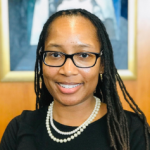 Brandeis Marshall is founder and CEO of DataedX Group, a social impact business that provides learning and development activities on recognizing algorithmic harms and humanizing data practices for data educators, scholars and practitioners. She is also Full Professor of Computer Science at Spelman College. She holds a PhD from Rensselaer Polytechnic Institute. She recently published a book titled: “Data Conscience: Algorithmic Siege on our Humanity”.
Brandeis Marshall is founder and CEO of DataedX Group, a social impact business that provides learning and development activities on recognizing algorithmic harms and humanizing data practices for data educators, scholars and practitioners. She is also Full Professor of Computer Science at Spelman College. She holds a PhD from Rensselaer Polytechnic Institute. She recently published a book titled: “Data Conscience: Algorithmic Siege on our Humanity”.
In the first episode of the GRACE podcast, Brandeis talked to Harriett Jernigan about her research, and much more: GRACE Podcast: Dr Harriett Jernigan interviews Dr Brandeis Marshall.
 Isabel Cachola is a PhD student studying Computer Science at the Johns Hopkins Center for Language and Speech Processing. Previously she was a Pre-Doctoral Young Investigator at the Allen Institute for AI on the Semantic Scholar team. She is originally from Texas and completed her BSc in Mathematics at the University of Texas at Austin. Her research interests are in Natural Language Processing, in particular, text generation, summarization, question answering, language modelling, natural language understanding, and computational social science.
Isabel Cachola is a PhD student studying Computer Science at the Johns Hopkins Center for Language and Speech Processing. Previously she was a Pre-Doctoral Young Investigator at the Allen Institute for AI on the Semantic Scholar team. She is originally from Texas and completed her BSc in Mathematics at the University of Texas at Austin. Her research interests are in Natural Language Processing, in particular, text generation, summarization, question answering, language modelling, natural language understanding, and computational social science.
We chatted to Isabel about her work as part of our New voices in AI series: New voices in AI: Isabel Cachola
 Jasmina Gajcin is a PhD student at Trinity College Dublin. Her research focuses on explainability for reinforcement learning agents and specifically on developing counterfactual explanations. Aside from research, she enjoys teaching and serves as a tutor in Scholar Ireland and CodePlus programs for promoting computer science careers to secondary school students.
Jasmina Gajcin is a PhD student at Trinity College Dublin. Her research focuses on explainability for reinforcement learning agents and specifically on developing counterfactual explanations. Aside from research, she enjoys teaching and serves as a tutor in Scholar Ireland and CodePlus programs for promoting computer science careers to secondary school students.
We interviewed Jasmina about work conducted with Ivana Dusparic into counterfactual explanations and some of the challenges of implementing them in reinforcement learning settings: Counterfactual explanations for reinforcement learning: interview with Jasmina Gajcin.
 Angelie Kraft has an interdisciplinary background in Psychology and Computer Science. She is currently a doctoral student at the Semantic Systems group at Universität Hamburg, where she researches natural language processing and knowledge-driven technologies with a focus on bias and fairness aspects.
Angelie Kraft has an interdisciplinary background in Psychology and Computer Science. She is currently a doctoral student at the Semantic Systems group at Universität Hamburg, where she researches natural language processing and knowledge-driven technologies with a focus on bias and fairness aspects.
Angelie told us about the findings from her recent research on bias in knowledge graphs: The lifecycle of “facts”: a survey of social bias in knowledge graphs – interview with Angelie Kraft.
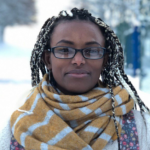 Abeba Birhane is a Senior Fellow in Trustworthy AI at Mozilla Foundation. She is also an Adjunct Lecturer/Assistant Professor at the School of Computer Science at University College Dublin, Ireland. She holds a PhD from University College Dublin. Abeba is an interdisciplinary researcher and her research interests sit at the intersection of cognitive science, AI, complex science, and theories of decoloniality.
Abeba Birhane is a Senior Fellow in Trustworthy AI at Mozilla Foundation. She is also an Adjunct Lecturer/Assistant Professor at the School of Computer Science at University College Dublin, Ireland. She holds a PhD from University College Dublin. Abeba is an interdisciplinary researcher and her research interests sit at the intersection of cognitive science, AI, complex science, and theories of decoloniality.
In this episode of The Good Robot Podcast, Abeba talks about changing computer cultures: The Good Robot Podcast: featuring Abeba Birhane.
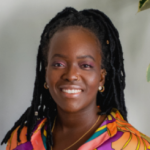 Seyi Akiwowo is the founder and CEO of Glitch, a charity that’s been on a mission to end online abuse by making digital citizens of us all since 2017. Seyi is also an author, a consultant and writer within the political and technology space, and a former TED speaker. Last year, she published a book entitled: “How to Stay Safe Online: A digital self-care toolkit for developing resilience and allyship”
Seyi Akiwowo is the founder and CEO of Glitch, a charity that’s been on a mission to end online abuse by making digital citizens of us all since 2017. Seyi is also an author, a consultant and writer within the political and technology space, and a former TED speaker. Last year, she published a book entitled: “How to Stay Safe Online: A digital self-care toolkit for developing resilience and allyship”
In this episode of The Radical AI Podcast, Seyi chats to hosts Dylan and Jess about staying safe online: Radical AI podcast: featuring Seyi Akiwowo.
 Tanja Katharina Kaiser is a postdoctoral researcher at the University Konstanz, Germany, in the Cyber-Physical Systems Group. She is an affiliate member of the Centre for the Advanced Study of Collective Behaviour. She holds a PhD from University of Lübeck, Germany. Her research focus is on evolutionary swarm robotics, but she is also interested in swarm intelligence and bio-inspired robotics in general.
Tanja Katharina Kaiser is a postdoctoral researcher at the University Konstanz, Germany, in the Cyber-Physical Systems Group. She is an affiliate member of the Centre for the Advanced Study of Collective Behaviour. She holds a PhD from University of Lübeck, Germany. Her research focus is on evolutionary swarm robotics, but she is also interested in swarm intelligence and bio-inspired robotics in general.
Tanja told us about her research on swarm robotics in this interview: New voices in AI: Tanja Kaiser.
 Anna Belardinelli is Principal Scientist at the Honda Research Institute Europe. She holds a MSc and a PhD in Computer Engineering, and a German Habilitation in Cognitive Science. Her research interests span themes in human-robot interaction, artificial intelligence, and cognitive science.
Anna Belardinelli is Principal Scientist at the Honda Research Institute Europe. She holds a MSc and a PhD in Computer Engineering, and a German Habilitation in Cognitive Science. Her research interests span themes in human-robot interaction, artificial intelligence, and cognitive science.
Anna wrote about her work on teleoperation, where she introduced an intention estimation model that relies on both gaze and motion features: Estimating manipulation intentions to ease teleoperation.
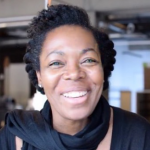 Nakeema Stefflbauer is a tech product leader, operator, founder and venture partner with a focus on scalable impact tech and AI-driven businesses that solve real environmental, social and governance problems. She holds MA and PhD degrees from Harvard University, a BA from Brown University, and an executive MBA from the disruptive Quantic School of Business and Technology.
Nakeema Stefflbauer is a tech product leader, operator, founder and venture partner with a focus on scalable impact tech and AI-driven businesses that solve real environmental, social and governance problems. She holds MA and PhD degrees from Harvard University, a BA from Brown University, and an executive MBA from the disruptive Quantic School of Business and Technology.
Nakeema was a guest on the GRACE podcast, hosted by Harriett Jernigan: GRACE Podcast: Dr Harriett Jernigan interviews Dr Nakeema Stefflbauer.
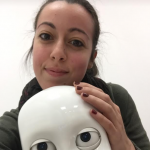 Gabriella Pizzuto is a senior researcher in robotics and applied machine learning working at the University of Liverpool. She holds a PhD in Computer Science from the University of Manchester. Her research interests lie at the intersection of robot learning and control, focusing on generalisation and safe human-robot collaboration. She is passionate about deploying algorithms to control the dynamic behaviour of robots with the goal of moving closer to robots that can adapt in real-world environments.
Gabriella Pizzuto is a senior researcher in robotics and applied machine learning working at the University of Liverpool. She holds a PhD in Computer Science from the University of Manchester. Her research interests lie at the intersection of robot learning and control, focusing on generalisation and safe human-robot collaboration. She is passionate about deploying algorithms to control the dynamic behaviour of robots with the goal of moving closer to robots that can adapt in real-world environments.
In this blog post, Gabriella writes about her research on robot skill learning in a laboratory setting: Accelerating laboratory automation through robot skill learning.











